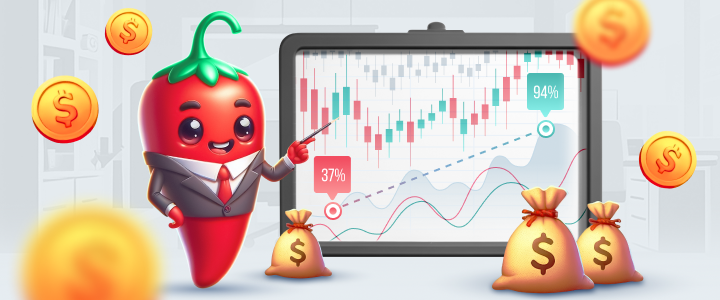Free, high-quality trading - how to improve your trading results?

At this stage, growth seems to be the fastest. But the knowledge here is mostly theoretical. A novice trader, like a viewer of a TV series, must get to know the characters. Learn the historical period. And only then "predict the plot twists".
At the next stage - practical, the basis is squeezed out. The trader is less and less interested in theories. He needs "signs" with high predictive value. And it does not matter whether these are fundamental models, technical patterns or astrology. The trader is ready to use everything. Growth here is still extensive, but with greater selectivity. Knowledge for the sake of knowledge is left behind. Only practical value.
Over time, all the main "plots" converge into a common understanding. All the series merge into one. And the trader is mainly engaged in intensive development. He looks inside himself. From the strategies known to him, he combines the best combinations. Under the current circumstances, but taking into account his psychological characteristics.
1. Development tools
At each stage, the trader may need different development tools. Books, films, educational videos, courses. Usually, an hour a day or more is allocated for them. And they study according to a pre-compiled list.
There are two main tasks here. The first is the transition of quantity into quality. The laws of dialectics work independently of us. And the second task is to cling to interesting ideas. Write them down to check later. And if successful, integrate them into the trading system.
But in addition to a high-quality flow of information, you need tools to maintain balance and progress. A good way to stay on course is records. You will need at least two diaries.
Before trading, the trader must analyze the latest transactions. This will give the necessary patience. Discipline when choosing trading signals. And most importantly, it will connect the entire sequence of operations into a single story. The trader will perfectly remember previous mistakes, successes, feelings and thoughts about how it should have been done.
The second type of records concerns the search for strong patterns and other improvements to the trading system. The purpose of this diary is to compile a history of the search for the ideal strategy. Perhaps it exists. Perhaps everyone has their own. The main thing is not to allow experimental strategies to real trading. At least until they successfully pass a period of 50-100 transactions on a demo account.
In research work, an "hour of stupid ideas" can be useful. When absurd patterns are taken for an experimental strategy. This gives an understanding that profit is hidden not only behind hackneyed ideas. But also in non-obvious places.
2. List of books, films and other
Before you start self-development, it is worth making a rough list. It is boring. But it eliminates the need for an agonizing choice of what to study today. Books and films can be alternated by day. The main thing is consistency.
Books can be divided into 2 parts. The first is the basics. The second is the books of strong traders. For macroeconomics, it is worth taking a simple textbook. No need to read it. It will take years to deeply understand it. And the main concepts can be grasped in a month or two.
In corporate statistics, there are classics by Benjamin Graham and Aswath Damodaran. This is even more complex than macroeconomics. There is no need to go into depth. For starters, it is better to find a brief summary of the main ideas. There is even a course of lectures by Damodaran on YouTube.
When choosing books by strong traders, it is worth turning to facts. For example, Larry Williams has not yet been surpassed in the field of public trading. In 1987, at the Robbinson Cup World Championship, he made 11,376% annual return. His books are definitely worth reading.
Marty Schwartz can also be included here. He showed a smaller return, but he did it regularly and at various tournaments. Ryan Jones' book "Make Millions by Playing with Numbers" is useful for understanding the mathematics of trading. For psychology, "Trading Chaos" by Bill Williams, books about Jesse Livermore and Edward Thorp are suitable.
Feature films have low educational value. But they provide relaxation and inspiration. Among the most interesting: Dumb Money, Pi, Billions, Limitless, Wall Street, The Big Short, A Good Year, Revolver. The list can be continued. There are documentaries and podcasts. But their choice should be treated with the same attention as books. It is worth trusting those who have proven their strength.